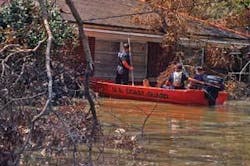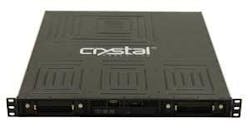Coast Guard adopts F4W and Crystal Group solution for Hurricane Katrina relief effort
By Courtney E. Howard
LAKE MARY, Fla. - The U.S. Coast Guard, just two days after Hurricane Katrina ravaged the South, called on F4W to solve a critical communications problem at the Joint Naval Air Station in Belle Chase, La., which was designated as the operation center for USCG search-and-rescue efforts.
“Immediately following Hurricane Katrina, 3 million phone lines, 38 ‘911’ call centers, and 1,000 cellular towers were out of service,” recounts Phil DuMas, vice president of research and development at F4W in Lake Mary, Fla. “Twenty thousand phone calls to emergency services failed to go through the first day, and 100 TV and radio stations were off the air.”
This nature-induced communications gap contributed to the loss of life, and certainly presented a seemingly insurmountable challenge to those professionals responding to the disaster, including Coast Guard personnel. “Their efforts were severely hindered by zero communication infrastructure and unreliable connection via VSAT telephones to their air rescue personnel,” DuMas says.
Especially given the sheer expanse of communities affected, spanning multiple states, a reliable communications system was needed then, perhaps more than ever.
Members of a Louisville, Ky.-based Coast Guard Disaster Area Response Team search for survivors of Hurricane Katrina. (Photo by L.F. Chambers.)
U.S. Coast Guard Commandant Thomas H. Collins offers insight into the severity of the situation. “In an average year, the Coast Guard saves 5,500 lives,” Collins said in written testimony last November before the House Homeland Security subcommittee on emergency preparedness, science, and technology.
“Within 48 hours, the Coast Guard achieved half of that total in Louisiana and Mississippi alone,” Collins wrote. “By September 14, Coast Guard forces had rescued 24,135 people by boat and helicopter and evacuated 9,409 more from 11 hospitals for a total of 33,544 rescues . . . statistically, seven years worth of search and rescue compressed into a two-week period.”
Solving the communications quandary, Coast Guard personnel turned to F4W, a developer and provider of rapidly deployable, mobile, wireless, broadband IP-based networks and communications applications for the transmission of voice, data, and video.
F4W’s products and services provide immediate networking capabilities and connectivity following virtually any incident that interrupts, compromises, or destroys traditional networks, according to company executives. Its solutions can be used on an ad hoc basis to address short-term needs because they eliminate the need for permanent communications infrastructures.
Crystal Group’s RS112 rugged server is integral to F4W’s TWEB network product line for homeland security and first response applications.
The Coast Guard tapped F4W’s Tactical Wireless Emergency Broadband (TWEB) networks. Specifically for homeland security, first responders, and law enforcement agencies, TWEB products are designed to deliver critical wireless communications networks and immediate connectivity in hostile environments and under extreme conditions, when traditional communications infrastructure have failed or have been destroyed.
Integral to the company’s TWEB product is the RS112 rugged server from Crystal Group Inc. in Hiawatha, Iowa. The RS112 helps users to control and maintain the wireless quad-division multiple access (QDMA) mesh network. The server previously adopted by F4W’s TWEB product line was unable to perform in harsh environmental conditions and high temperatures, prone to overheating, and unreliable.
James Shaw, vice president of engineering at Crystal Group, acknowledges the challenge of providing open-architecture systems, keeping the technology current, and providing hardware able to be deployed in harsh environments without a high price tag. The Crystal Group team meets these challenges head on by using commercially available server CPU cards and designing and building its own cards.
“We see a great deal of interest, particularly from our government customers, in computers that can take the abuse of mobile ground pounding, such as in a Humvee, and can withstand extreme desert heat for extended periods of time,” says Shaw.
Crystal Group servers take advantage of not only high-volume, high-speed on convective cooling fans, but also a conductive cooling approach that mimics that used in the avionics industry. Moreover, the RS112 rugged server’s all-aluminum chassis provides twice the thermal conductivity of 1018 CR steel. Both innovations contribute to an increased CPU ambient temperature range.
“F4W provided an immediate, reliable, wireless communications infrastructure on site, leading to the deployment of 12 Incident Area Command Control Networks throughout Texas, Louisiana, Mississippi, and Florida,” notes DuMas. The Coast Guard employed F4W’s technology, equipment, and personnel over several months in various locations, and continues to use TWEB networks where and when duty calls.
For more information, visit www.F4Winc.com and www.crystalpc.com.


